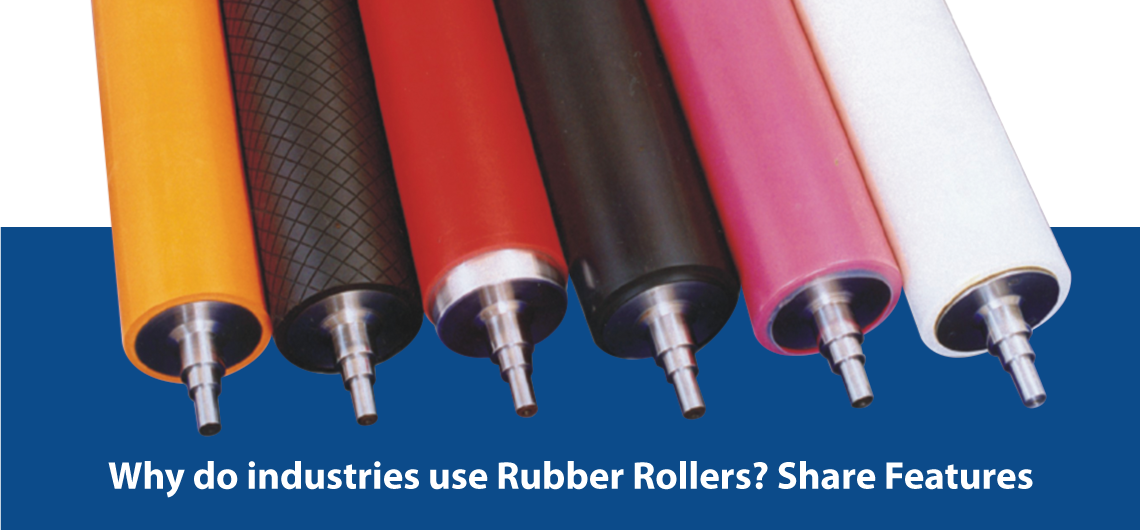
Over the years, the Rubber Rollers manufacturing industry has witnessed a sweeping change. Cutting-edge technology and changing market dynamics have been instrumental in defining the future. Former has been a blessing in disguise, while latter as a conventional adage says: "Necessity is the mother of invention” had played a crucial role.
Manufacturing process
The Industrial Rubber Rollers are being manufactured through standard processes, including casting, molding, and extrusion. Industrial Rollers Companies are in fact OEM. The word OEM stands for Original Equipment Manufacturer. An OEM is a manufacturing company that procures spare parts and equipment from other manufacturers or suppliers. These are then used to manufacture and assemble a wide range of products and sold to other companies. The finished product is leveraged by companies to fulfill their business-centric objectives.
Unique features of Industrial Rubber Rollers
The rubber roller is unique; it’s identified for its range of exclusive features, including:
-
Resistance to abrasion
-
Uniform surface
-
Precision driven cambering
-
Easy installation
-
Flawless performance
Application of Rubber Roller
The Rubber Roller is being extensively used for a wide range of applications, cutting across industries, including Gravure printing, Flexographic printing, Solventless lamination, Adhesive coating, Blown film line, Palletize machine, Squeezing materials, and Removing wrinkles from the film among others.
Types of Rubber Rollers
According to the Rubber Roller industry experts, there are several types of Industrial Rubber Rollers. Depending on the coating material, Rubber Rollers have been classified into several types, including Press Roller, Felt Guide Roller, Press Guide Roller, Cough Roller, Guide Roller, Size Press Roller, Lump Break Roller, and Bottom Press Roller among others.
Industrial use
Rubber Rollers are being used on a large scale, in a wide range of industries, including Paper, Plywood, Tyre, Steel, Packaging, and Textile among others.
Importance of a few Rubber Rollers
Glue Spreader Roller
The Glue Spreader Rollers are tailor-made to seamlessly spray adhesive on plywood. The product is used on a large scale in the plywood industry.
The Polyband Expander
The quality-driven Polyband Expander rollers provide ceaseless stretch to the web and separate the web following the procedure of slitting. The product removes web wrinkles efficiently and performs optimally during the PP and HM liner bags
Heavy Nip & Padding Rollers
The Heavy Nip & Paddling Roller is being used for various applications in the textile industry, including bleaching, washing, and mercerizing. Squeezing efficiency is another feature of the product.
Custom-designed or custom-built Industrial rollers
Custom-designed Rubber Rollers are an exception. Combining the vast industry experience and latest technology, Team Arvind delivers custom-designed rubber rollers to suit industry-specific dimensions. Not many companies have the professional expertise to offer custom-designed solutions.
Pioneers in Industrial Rubber Rollers
Arvind Rub-Web Controls Ltd. is a pioneer manufacturer, supplier, and exporter of Industrial Rubber Rollers. The four decades of unmatched industry legacy have continued to drive the exponential growth of the company and enable it to set new benchmarks for the industry. Here are a few unique features that set the company apart from the competitors:
-
State-of-the-art manufacturing facility – 1,35,000+ sq.ft
-
Stringent “Quality Policy”
-
Innovative product
-
Expertise in Custom-built designs
Over the years, the Ahmedabad headquartered Industrial Roller Company, India has enabled manufacturers cutting across domain expertise in accomplishing their business goals.
Summary
Never compromise with excellence and efficiency of the Rubber Roller. Both the features are directly proportional to your business. The low efficiency of the product impacts the production cost. The credibility of the manufacturer assumes significance. Validate the manufacturer through its antecedents and testimonials. However, no compromise on quality!


